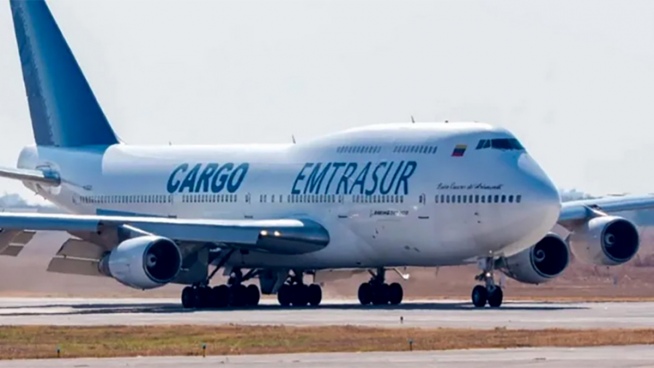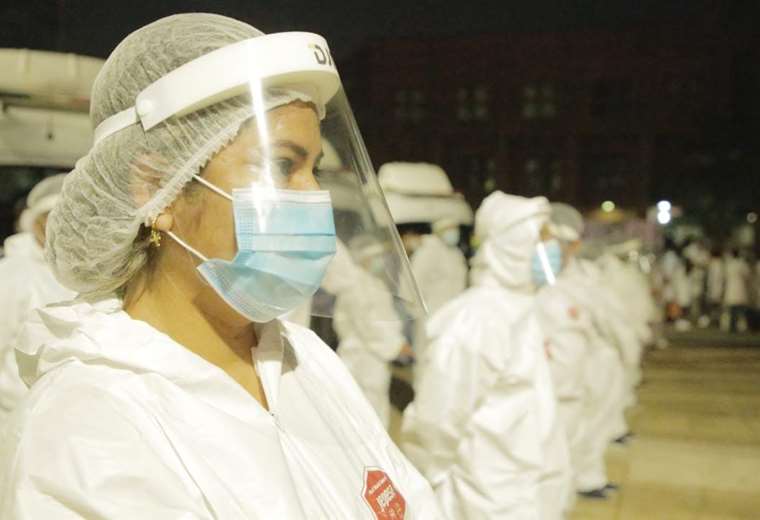The Argentine federal justice awaits international information and results of technological expertise before defining how to continue with the cause in which it is being investigated whether any of the plane’s crew of Emtrasur that arrived in Argentina on June 6 last had objectives other than those declared before control authorities and the Justice: transfer of auto parts and flight instruction.
The United States, Uruguay and Venezuela are some of the countries from which the Argentine Justice demanded information on which he has not yet received answers; which constitutes a brake for the investigation undertaken in a preventive manner and without an unlawful act having been detected up to now that allows foisting a crime on the accused.
Federal judge Federico Villena revealed some guidelines of the investigation in last Monday’s ruling with which he ordered that the passports of seven of the crew members (four Iranian citizens and three Venezuelans) be withheld and ordered the return of the documents to the others. 12 (an Iranian and the rest Venezuelans), which would enable them to leave the country.
The judge seeks to determine whether, “under the guise or ‘screen’ of a lawful activity, part of the crew would be carrying out various and undetermined illegal maneuvers that affect national and regional security,” according to the resolution of some 260 pages to the that Télam agreed.
The magistrate try to set if some of the defendants are participating in maneuvers of “financing terrorism operations (specifically with Hezbollah)” or are part of “a plan linked to the aforementioned terrorist organization,” the ruling states.
In justifying the way in which the investigation was conducted, Judge Villena pointed out in his ruling of 267 “international law expresses with determination the need for States to adopt preventive measures to repress the preparation of any act of terrorism, considering that the first step to That is financing.”
In line with this statement, he recalled that the case began with a complaint filed by the Delegation of Argentine Israelite Associations (DAIA) in which suspicions were expressed about the real reasons for the landing of the plane in Argentina and about the crew and his possible links with one of those accused of the attack on the AMIA.
A court in the district of Columbia asked to seize the plane for alleged violation of the export laws of that country; while in Caracas, President Nicolás Maduro demanded the return of the ship belonging to a state company
for these hours, the file is watched with zeal from the US and Venezuela: In the northern country, a court in the district of Columbia asked to seize the plane for alleged violation of the export laws of that country; while in Caracas, President Nicolás Maduro demanded the return of the ship belonging to a state company of the South American country.
While the international claims win the media agenda, the collaboration of the different countries in the judicial file that is processed in Argentina is long in coming: Judge Villena, for example, is still awaiting answers from Uruguay, Venezuela, Aruba, the Dominican Republic and USA.
Federal justice has not yet received a response from Montevideo to one of the most important queries in the file: why Uruguay did not accept the entry of the Emtrasur company’s Boeing 747 Dreamliner whose route from Buenos Aires had been previously authorized.
Venezuela, for its part, did not respond to requests for supporting documentation for the aircraft and for the loading and unloading of passengers and merchandise in the months of May and June; while Aruba and the Dominican Republic were asked for information related to the passage of the plane through their respective territories.
Judge Villena also requested more information from the United States about the plane and its crew and asked the FBI in particular to request information from the company “The Boeing Company”, so that it informs what the flight simulator is. of aircraft “Boeing 747¬300M, Dreamliner” closest to Venezuela.
The FBI has already collaborated with the investigation and Judge Villena highlighted it in a paragraph of the ruling in which he pointed out that in the file “there is a document of vital importance” sent by the US Federal Bureau of Investigation “regarding the association of the Iranian citizen Gholamreza Ghasemi (plane pilot) to the designated terrorist groups, the Iranian Revolutionary Guard Corps Quds Forces (IRGC¬QF) and Hezbollah.”
The pilot Ghasemi is precisely one of the crew members of the plane to whom the judge upheld the ban from the country because he understands that there are situations that have not yet been clarified, such as his civil flights to Damascus (Syria) and the presence of photos of military weapons on his cell phone. and people linked to the Islamic Revolutionary Guard and Hezbollah.
Among those who will not yet be able to leave the country is also the Venezuelan mechanic José García Contreras, who on June 11 had a communication on WhatsApp in which he made reference to the fact that they had not found anything and a “top secret” issue that he did not More references appeared.
In the same ruling, the magistrate ordered that the passports be returned to 12 of the crew members who until then had been prohibited from leaving the country and clarified that, although they remain charged, there are no indications in the file that enable him to maintain the measure. willing; a decision that could be appealed by the prosecutor who had asked that the passport not be returned to them.
For the prosecutor Cecilia Incardona, the return of the passport to any of the defendants implied the procedural risk of not being able to have them back in the country in case it was necessary, for example, to investigate them, since neither Venezuela nor Iran extradite nationals.
Among the 12 crew members authorized to leave the country there are two captains in training, a flight officer in training, an engineer in training, a first officer, a flight advisor, a maintenance technical advisor, two aircraft cargo managers, a person in charge of feeding the personnel, a flight dispatcher and an aircraft line maintenance manager, according to the information provided by the defense attorney.
“There is not remotely nor ever was there even an indication of the commission of any crime, which after more than a month of secret investigation, in which this defense has had to be handled practically blindly, has finally come to light, which is unobjectionable,” lawyer Hernán Carluccio had argued when he asked that the crew members be authorized to leave the country.
Referring to the crew members to whom he ordered to return their passports, Judge Villena stated: “It is reliably proven in the records that all of them have civil aviation as their main profession, which entails the constant entry and exit of different countries in the world. This circumstance would facilitate their extradition, as it is highly probable that they were caught in another country other than that of their nationality.”
“This, in the case, of course, that, in the future, the evolution of the investigation (fundamentally the result of the pending warrants) abruptly modifies its situation. And I say this, because to date it has not been possible to obtain even a indication of their possible participation in the object of this investigation,” he continued.
“There is not even an indication of the commission of any crime, which after more than a month of secret investigation, in which this defense has had to be handled practically blindly”Hernan Carluccio
The magistrate’s statement coincides, at some point, with what was stated by the defense in relation to the number of crew members and the possibility that some of them participated in the flight as instructors, as the intervener also maintained at the time. of the Federal Intelligence Agency (AFI), Agustín Rossi.
Such an instruction would be related to the sale of the plane by the Iranian firm Mahan Air to the Venezuelan firm Conviasa, for which the US assures that the export law of that country in which the remaining plane would have been manufactured was violated. in Argentina since June 6.









